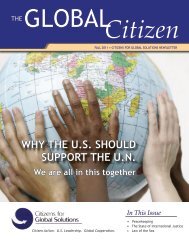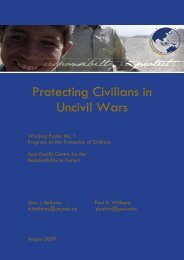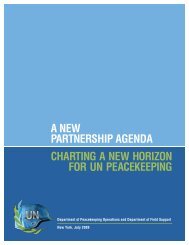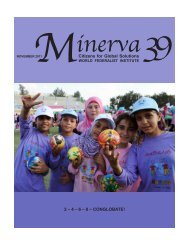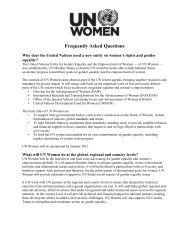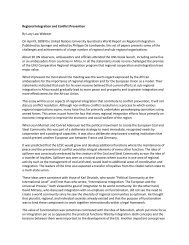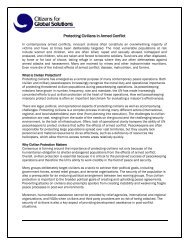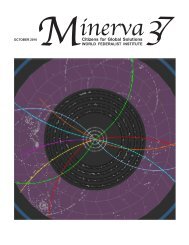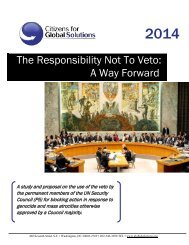Minerva, Spring 2008 (Volume 32) - Citizens for Global Solutions
Minerva, Spring 2008 (Volume 32) - Citizens for Global Solutions
Minerva, Spring 2008 (Volume 32) - Citizens for Global Solutions
Create successful ePaper yourself
Turn your PDF publications into a flip-book with our unique Google optimized e-Paper software.
Kelly Whitley, Deputy Convenor<br />
of the co-sponsoring Responsibility<br />
to Protect Coalition, prepared<br />
this summary of the R2P conference<br />
presented recently by the Center <strong>for</strong><br />
International Human Rights of Northwestern<br />
University School of Law, which<br />
has granted permission to reprint these<br />
excerpts. Statements of fact and expressions<br />
of opinion in this report may not<br />
necessarily reflect the observations or<br />
views of particular conference participants,<br />
their respective organizations, or<br />
the project funders. Individual participants<br />
in the dialogue may not agree with<br />
the report in its entirety.<br />
The Center <strong>for</strong> International Human<br />
Rights (CIHR) at Northwestern University<br />
School of Law’s Bluhm Legal Clinic<br />
concentrates on “emerging human rights<br />
norms and related issues” and provides<br />
“clinical experiences <strong>for</strong> students interested<br />
in the protection of human rights on a<br />
global scale”. It focuses much of its work<br />
on the Responsibility to Protect doctrine,<br />
corporate human rights responsibility, the<br />
jurisprudence of the international criminal<br />
tribunals, Alien Tort Statute litigation,<br />
death penalty cases, truth and reconciliation<br />
commissions, and issues related to the<br />
<strong>for</strong>thcoming review conference of the International<br />
Criminal Court. FMI: .<br />
The Responsibility to Protect (R2P) Coalition<br />
is a non-partisan, non-profit grassroots<br />
organization. Its mission is “to convince<br />
the American people and its leaders<br />
to embrace the norm of the responsibility<br />
to protect as a domestic and <strong>for</strong>eign policy<br />
priority; to convince the United States<br />
that it must demonstrate its commitment<br />
to effectively upholding global human<br />
rights by joining the International Criminal<br />
Court; and to convince civil society<br />
leaders that the United Nations and the<br />
International Criminal Court must be empowered<br />
with a legitimate and effective<br />
deterrent and en<strong>for</strong>cement mechanism to<br />
arrest indictees of atrocity crimes”. A core<br />
group of prominent academic, legal, and<br />
religious organizations provides guidance<br />
and oversight on how best to achieve<br />
“R2P-appropriate action”. FMI: .<br />
The Responsibility to Protect & the ICC:<br />
America’s New Priorities<br />
Summary<br />
25 • <strong>Minerva</strong> #<strong>32</strong> • June <strong>2008</strong><br />
Kelly Whitley<br />
The December 2007 conference on “The Responsibility to Protect and the International<br />
Criminal Court: America’s New Priorities” was the most in-depth discussion to<br />
date on how the Responsibility to Protect Doctrine (R2P) can be advanced with greater<br />
American participation in the International Criminal Court (ICC). Much attention has<br />
been paid to advancing the diplomatic, economic and military aspects of R2P, but this<br />
conference was the first of its kind to consider the judicial element of the Responsibility<br />
to Protect doctrine. The conference also focused discussion on the development<br />
of an international framework to empower the International Criminal Court with a<br />
mechanism to en<strong>for</strong>ce its judgments – an International Marshals Service. This is a<br />
capacity that the Court currently lacks and that gap in en<strong>for</strong>cement has greatly strained<br />
the ability of the Court to achieve custody of indicted fugitives, particularly where<br />
States fail to cooperate with the Court’s requests.<br />
As the international community is witnessing around the world, … atrocity crimes<br />
of the most conscious-shocking nature are being committed with impunity, despite<br />
the constant pledge resounding in many nations’ capitals of “never again” allowing<br />
such situations to occur. R2P is a new and emerging framework grounded in the rule<br />
of law that aims to protect populations from genocide, crimes against humanity and<br />
war crimes. Conferees agreed that a discussion was needed on how to devise useful<br />
and pragmatic strategies on what steps the United States could take domestically, and<br />
with other international institutions, to implement R2P judicially. Conferees felt that a<br />
nexus exists linking the R2P with the ICC through the moral commitment guiding both<br />
to address and ultimately eradicate situations of atrocity crimes.<br />
Conferees also felt that justice and peace [are] complementary, and that a comprehensive<br />
peace process must strike the right balance of meeting the highest standards of international<br />
legal norms and procedures while also maintaining respect <strong>for</strong> the cultural<br />
and political sensitivities of the societies affected. Accordingly, the ICC falls within<br />
this comprehensive legal approach, and conferees agreed it is time to broaden domestic<br />
awareness in and support <strong>for</strong> greater American involvement in the Court. Specifically,<br />
conferees strongly felt that common American misperceptions — particularly among<br />
officials at the Department of Defense and members of Congress — about the Court<br />
must be corrected.<br />
… [K]ey findings and recommendations summarized in subsequent sections of this<br />
report are listed below:<br />
Political Issues on ICC and R2P<br />
• There is clear need <strong>for</strong> serious research and thoughtful policy analysis <strong>for</strong> government<br />
officials, academics, civil society, and others concerned with advancing the issues of<br />
R2P and the ICC, as well as broad community dialogue and engagement.<br />
• An in<strong>for</strong>mation campaign is needed to build broad-based American support <strong>for</strong> the<br />
greater participation in the international judicial intervention aspects of R2P, and specifically<br />
in the ICC, that must address a wide variety of political, legal and attitudinal<br />
issues. When crafting the campaign message, advocates must capitalize on the dynamic<br />
of “change” taking place in the current US political environment by communi-



